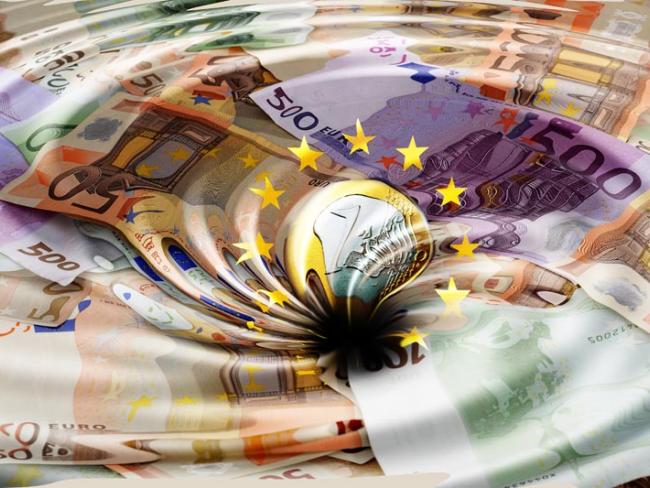Britain has been helping to keep the ailing currency afloat – using our pensions as collateral…
The euro currency was created with British capital, which continues to support it. And that capital came from British workers. It’s a strange story, worth recounting, with an ongoing importance.
In 1999 Gordon Brown, then Chancellor of the Exchequer, sold Britain’s gold reserves. It’s often mentioned that the gold price rose sharply and never fell back – it’s now more than four times the 1999 price. Less publicised is how the proceeds of the sale were reinvested.
Over a third of the proceeds were used to help launch the euro. What Brown did was to purchase the new euro currency in 2000 to help underwrite international market confidence in it. Brown then told us that he kept Britain out of the euro. No, the British working class did that. Brown helped to create the monster.
Deception
This type of deception continues to the present day. The City of London currently acts as a clearing house for euro transactions. In effect the City insures commercial euro transactions and euro-denominated banks against adverse movements in interest rates.
This facility is provided through derivative financial instruments known as “interest rate swaps”. Without them costs would rise for European banks and companies transacting in euros. Many banks would become insolvent leading to the likely collapse of the euro currency.
The City needs access to collateral to be able to offer this level of insurance. In other words, access to very large chunks of capital that can be used as collateral in the event of an insurance claim due to an unanticipated increase in the rate of interest.
And the collateral the City uses is part of our accumulated pension fund savings. These are valued at over £2 trillion, roughly equal to Britain’s annual gross domestic product.
‘The proposal will need insurance – the working class’s pensions…’
No other EU country has anywhere near this amount of accumulated pensions capital or anything similar. At best some have about 6 per cent of GDP. This is because EU countries pay their pensions from annual tax receipts rather than building up funding in advance – our arrangement is one that the EU frequently tries to undermine.
So the capital tied up and set aside for pensions for British workers is used to support the euro. In effect the value that British workers have produced over the generations is applied against us in favour of the euro currency and its attaching oppressiveness.
The EU now wants to take matters further. A Financial Times columnist said recently, “I concluded some time ago that a fiscal union is not sufficient to guarantee the future stability of the euro. What it requires instead is a full capital markets union.”
Ambitions
Recent comments from the European Central Bank underline that view. During an International Monetary Fund conference an ECB speaker said that a safe asset would also help the EU’s geopolitical ambitions.
The ECB speaker went on to say that the safe asset is “he who shall not be named”. That was a reference to the aim of mutualising euro debt by issuing a euro bond covering all euro participating countries. That move would completely liquidate what remains of those euro countries’ own sovereignty and fiscal controls.
And just like the launch of the euro in 2000 the euro bond proposal will need insurance underwriting and capital liquidity to attain market confidence. Well let’s put a name to that liquidity – it is called the pensions capital of the British working class.
Crisis
The ECB speaker went on to say that such assets are needed as collateral instruments in financial markets to replace national sovereign bonds in bank portfolios. Without safe assets, the eurozone will remain prone to crisis.
Central to EU/British negotiations has been to figure out how a capital markets union can be covertly brought about using British workers’ pension savings and without us noticing. It is time for British workers to take control of the wealth they have created and to use it to underwrite their own country’s development instead of the expansionist, anti-national aims of the EU.

